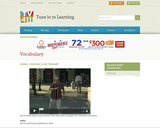
A short video on choosing the correct dictionary for each student's needs.
- Subject:
- English Language Arts
- Material Type:
- Lesson
- Provider:
- TV411
- Author:
- TV411
- Date Added:
- 02/26/2019

A short video on choosing the correct dictionary for each student's needs.
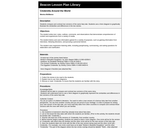
In this lesson, students compare and contrast two versions of the same fairy tale. Students use a Venn diagram to graphically illustrate the similarities and differences in the two stories.
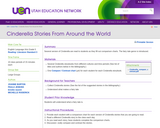
In this lesson, students complete comparison charts after listening to several versions of Cinderella.
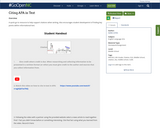
A quick go to resource to help support citations when writing. Also encourages student developemnt of finding key points within informational text.
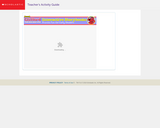
Students can practice their reading skills as they read stories with high-frequency words; interact with the computer to create new text; understand that changing one word in a sentence can change the meaning of the entire sentence; recognize consonant sound-spellings; distinguish easily confused letter pairs; and recognize common short and long vowel sounds as they participate in this interactive reading of Clifford's beloved stories.
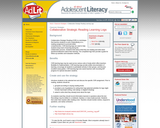
Collaborative Strategic Reading (CSR) is a technique that teaches students to work cooperatively on a reading assignment to promote better comprehension. CSR learning logs are used to help students keep track of learning during the collaboration process. Students think about what they are reading and write down questions/reflections about their learning. The completed logs then provide a guide for follow-up activities and evaluation methods.
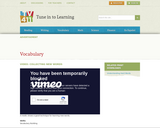
A short video on expanding and recalling new vocabulary words.

For this online interactive, students pick a color according to the color-vowel key and fill each word block according to the long and short vowel sounds. Students have fun with colors as they reinforce their concept of short and long vowels and learn new words. This is an interesting way to build students' vowel identification skills.
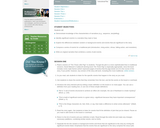
A strong plot is a basic requirement of any narrative. Students are sometimes confused, however, by the difference between a series of events that happen in a story and the plot elements, or the events that are significant to the story. In this lesson, students select a topic for a personal narrative and then do the prewriting in comic-strip format to reinforce the plot structure. Finally, they write their own original narratives based on the comic strip prewriting activity, keeping the elements of narrative writing in mind. This lesson uses a version of "The Three Little Pigs" fairy tale to demonstrate the literary element; however, any picture book with a strong plot would work for this lesson.

This resource contains a Powerpoint on commas, colons, and semicolons, as well as worksheets on the correct use of commas.

These resources were designed to help teachers build students’ capacity to read, think, talk, and write about complex texts. The 6-8 ELA modules fully address all the strands of the Common Core state standards: the reading standards for both literary and informational texts, the writing standards, the speaking and listening standards, and the language standards.
To ensure that students receive adequate support and practice, as well as sufficient time to meet the volume of reading required by the CCSS, this Interventions resources package provides suggestions and examples of literacy work to support, reinforce, and provide additional practice of the skills learned in the EL Education ELA modules.
This resource designed to help school leaders, instructional coaches, general education teachers, special education, and intervention teachers think and plan together about strategic ways to best use additional support time beyond the typical ELA block. The suggestions here could certainly be applied to all learners, but are targeted particularly for students who aren’t meeting grade level standards during a standard class period.
This package contains suggestions that teachers can adapt to meet the specific needs of their students needing additional support. Teachers should use their judgment and knowledge of the abilities of their particular students to focus this additional ELA practice and instruction where it is required, and to adapt the activities and examples accordingly.
There are various ways to organize time so teachers can pull small groups and provide additional whole-class instruction on discrete skills, as deemed necessary by formative assessments.
This package includes:
• Word Study and Vocabulary
• Additional Work with Related Texts
• Fluency
• Syntax and Mechanics
• Independent Reading
• Sample Schedule

Common Lit is a searchable collection of free fiction and nonfiction texts searchable by thematic connection, subject, discussion questions or text. Please note in order to access the entire site you will need to create a free account.

Students write the comparative form for the adjectives shown.

For this interactive quiz, students complete each sentence by choosing the correct pronoun. Students are able to track the number of correct and incorrect responses. Explanations are provided for incorrect responses.

Clarifying one’s identity is a process that goes on throughout life. In this poetry lesson, students will read, analyze and discuss Adrienne Rich's “Diving into the Wreck” as part of the complicated process of finding, and defining oneself.

For this online interactive, students practice their comprehension skills by listening to a story and answering questions about the story. There are several stories to choose from with four questions at the end of each story.
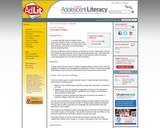
A concept map help students visualize various connections between words or phrases and a main idea. There are several types of concept maps; some are hierarchical, while others connect information without categorizing ideas. Most are comprised of words or phrases surrounded by a circle or square that connect to one another and ultimately back to the main idea through graphic lines. These lines help students to "negotiate meaning" as they read and make the meaning connections between the main idea and other information.
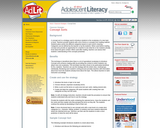
A concept sort is a strategy used to introduce students to the vocabulary of a new topic or book. Teachers provide students with a list of terms or concepts from reading material. Students place words into different categories based on each word's meaning. Categories can be defined by the teacher or by the students. When used before reading, concept sorts provide an opportunity for a teacher to see what his or her students already know about the given content. When used after reading, teachers can assess their students' understanding of the concepts presented.

For this online interactive, students gain an understanding of the concept of conjunctions. This game contains a lesson and four practice games. The lesson explains conjunctions with a definition and examples. The practice game contains questions, like sentence formation using conjunction words and fill in the blanks.

Worksheets and lessons on the correct use of prepositions for various reading levels.